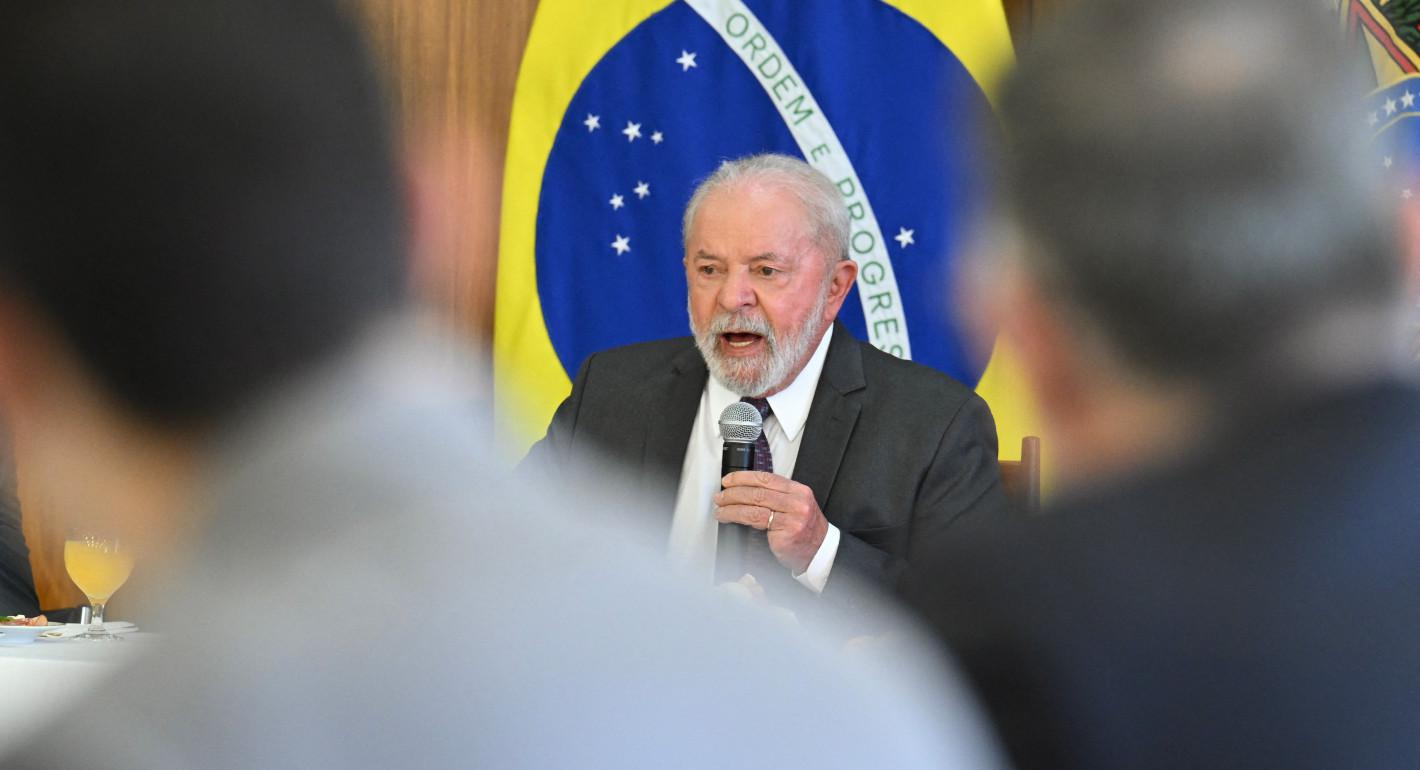Washington and New Delhi should be proud of their putative deal. But international politics isn’t the domain of unicorns and leprechauns, and collateral damage can’t simply be wished away.
Evan A. Feigenbaum
{
"authors": [
"Oliver Stuenkel"
],
"type": "commentary",
"centerAffiliationAll": "dc",
"centers": [
"Carnegie Endowment for International Peace"
],
"collections": [],
"englishNewsletterAll": "",
"nonEnglishNewsletterAll": "",
"primaryCenter": "Carnegie Endowment for International Peace",
"programAffiliation": "DCG",
"programs": [
"Democracy, Conflict, and Governance"
],
"projects": [],
"regions": [
"North America",
"South America"
],
"topics": [
"Democracy",
"Economy"
]
}
Source: Getty
One hundred days into his term, the president has taken steps to address the country’s divisions. But his attempts to play to his base are muddling his push for unity.
After Luiz Inácio Lula da Silva’s close victory in a highly acrimonious runoff election last year, the Brazilian president’s inaugural ceremony on January 1 was meant to have a soothing impact. Lula, who had built a remarkably broad alliance, was handed the presidential sash by a group of Brazilians representing the country’s vast diversity. An indigenous leader, a black female trash collector, and an activist with cerebral palsy, among others, stood in for outgoing president Jair Bolsonaro, who had left Brazil a few days prior to the end of his term. “No more hatred, fake news . . . and weapons,” the president told spectators, asking the country to “turn the page” after four years shaped by political turbulence and increasingly destructive polarization, as well as an election campaign that saw several cases of deadly violence between supporters of the two candidates.
One hundred days after his inauguration, the president has taken steps toward overcoming the deep divisions in Brazilian society. When mudslides killed more than sixty people after heavy rainfall in February, Lula jointly announced response measures with São Paulo Governor Tarcísio de Freitas, a Bolsonaro ally who had fiercely attacked Lula on the campaign trail.
On other occasions, too, Lula has sought to establish a constructive relationship with political leaders on the other side of the aisle while facing down the leftist wing of his own party. The president invited a large number of agribusiness leaders to join on his planned trip to China (delayed due to illness), an initiative largely meant to build greater rapport with a group that had been firmly part of Bolsonaro’s camp. A pragmatic stance on tax reform, a new fiscal framework to avoid excessive public spending, and a return to Brazil’s foreign policy tradition of being (broadly speaking) on good terms with everyone underline a genuine attempt to return to normality.
Yet, at the same time, the government’s first hundred days have also been shaped by the president’s at times controversial attempts to mobilize his base. While his rhetoric does not rise to the level of his predecessor, who systematically fanned the flames of polarization and demonized his opponents, Lula has engaged in a number of conflicts that complicate his previous commitment to turning the page in Brazil’s divisive politics. For example, the president seemed to promote a narrative that Central Bank president Roberto Campos Neto kept interest rates relatively high—they currently stand at 13.75 percent—because he disliked Lula or because he was seeking to help the banking industry.
The attacks on the banker generated concern among investors, undermining the Lula government’s efforts to generate confidence and allow interest rates to go down. The president’s insistence on demonizing Campos Neto—who also committed a political blunder by voting dressed in a shirt of green and yellow, the Bolsonaro campaign’s colors—can mostly be understood as an attempt to find a scapegoat. Most analysts expect Brazil’s economic situation to worsen in the course of 2023, a trend that will likely increase public discontent. Yet by turning the debate about Brazil’s high interest rates into a battle between “the people” and greedy financial elites, Lula missed an opportunity to engage in a more substantive debate about the economic challenges the country faces.
Three challenges suggest the overall political scenario in Brazil may become more turbulent. First, even though Brazil’s legislative period just started, the Lula government likely will struggle to cobble together majorities to pass legislation. Brazil’s notoriously fragmented Congress requires an unwieldy and never-ending process of offering pork barrel and ministerial jobs to ideologically flexible parties (known as the centrão) in order to support the government, which often leads to suboptimal allocation of public funds. It also makes the emergence of corruption scandals—the first of which have already begun to surface—highly likely. Considering the emergence of large-scale corruption scandals during the Workers’ Party’s previous administrations, such cases may have the potential to destabilize the government.
In addition, during last year’s election, Brazil’s Congress moved significantly toward the right, allowing Bolsonaro allies to hold the presidencies of important commissions overseeing topics such as the environment and public security. These positions provide the Lula administration with limited space to implement reform—a scenario that may produce frustration among Lula supporters.
Second, Brazil’s economic outlook is increasingly somber. In order to fulfill its promises of reducing poverty and offering better public services, the government will have to increase either taxes or public debt, forcing the president to make difficult choices he did not have to make during most of his first and second presidential terms from 2003 to 2010—a time when high commodity prices produced a more benign macroeconomic context.
As long as Brazil’s “lost decade” continues—GDP per capita has been all but stagnant since 2012—the anti-incumbency dynamic will remain dominant, almost inevitably leading to political instability. All of Brazil’s presidents during the past decade—Dilma Rousseff, Michel Temer, and Jair Bolsonaro—either were impeached or faced acute risk of impeachment. Since then, Brazil’s executive branch has slowly lost power to Congress and the judiciary, a process that has turned the heads of the House of Representatives and the Senate into de facto prime ministers and raised worrisome questions about governability.
Finally, while the Lula administration reacted well to the armed insurgency on January 8—which enjoyed tacit support from parts of Brazil’s security establishment, which remains close to Bolsonaro—the lingering presence of antidemocratic sentiment remains a complex challenge for the new government. Although the generals are momentarily on the defensive—chastised by unprecedented criticism of their ambiguous role during the attacks on Brazil’s presidential palace, Supreme Court, and Congress—the armed forces likely would be eager to reenter the political arena if discontent with the Lula government increases. Believing that Brazil has overcome the dangerous politicization of its armed forces would be a mistake, despite Lula sacking General Júlio César de Arruda, head of Brazil’s army, along with sixty military officers responsible for the president’s security.
Late last year, Brazil’s democracy stepped back from the cliff. Under Lula, a cautious sense of normality has taken hold. But arguing that Latin America’s largest nation is out of the woods would be premature.
Carnegie does not take institutional positions on public policy issues; the views represented herein are those of the author(s) and do not necessarily reflect the views of Carnegie, its staff, or its trustees.
Washington and New Delhi should be proud of their putative deal. But international politics isn’t the domain of unicorns and leprechauns, and collateral damage can’t simply be wished away.

Evan A. Feigenbaum
Senior climate, finance, and mobility experts discuss how the Fund for Responding to Loss and Damage could unlock financing for climate mobility.

Alejandro Martin Rodriguez
The EU lacks leadership and strategic planning in the South Caucasus, while the United States is leading the charge. To secure its geopolitical interests, Brussels must invest in new connectivity for the region.

Zaur Shiriyev
What happens next can lessen the damage or compound it.

Mariano-Florentino (Tino) Cuéllar
The uprisings showed that foreign military intervention rarely produced democratic breakthroughs.


Amr Hamzawy, Sarah Yerkes